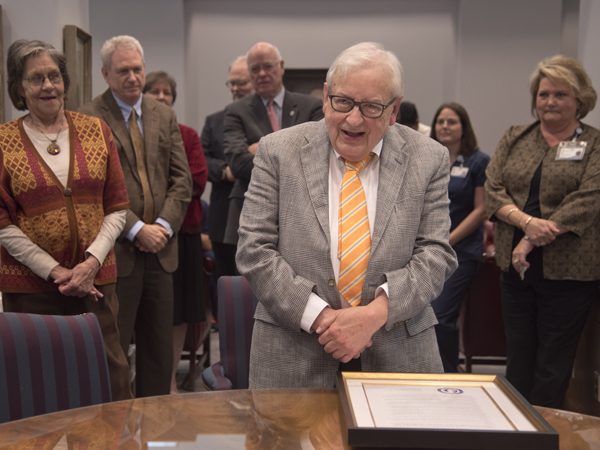Cruse, Lewis, Corbett retire after a combined 100-plus years of service

Published in News Stories on October 30, 2015
With the impending retirements of Dr. Julius Cruse, Dr. Robert Lewis and Dr. James Corbett, the Medical Center will lose approximately 115 years of institutional knowledge, but timeless friendships remain behind.
On Thursday, the three men were honored in two separate receptions that drew more than 100 colleagues, faculty, former students and other well-wishers to their side.
Corbett, professor of neurology and professor ophthalmology, has distinguished himself as a physician, researcher and teacher during his 25 years at the Medical Center.
A prolific author and pillar in the specialty of immunopathology, Cruse has served the Medical Center for 49 years and is a Guyton Distinguished Professor of Pathology, Medicine and Microbiology. During his four decades in Jackson, Lewis, a professor of pathology who earned his Ph.D. in pathology/immunology at UMMC, has co-authored numerous articles and books with Cruse, his cohort and friend.
“It's really rare that an institution has the opportunity to honor an institution,” said Dr. Ralph Didlake, professor of surgery, associate vice chancellor for academic affairs and chief academic officer, during a simultaneous send-off for Cruse and Lewis at the Rowland Medical Library.
“We're honoring two institutions.”

Dr. Robert Lewis, left, signs a copy of the Historical Atlas of Immunology for Dr. Stephen Stray, right, associate professor of microbiology. The book was co-authored by Lewis and Dr. Julius Cruse, both of whom were honored by a retirement reception Thursday in the Rowland Medical Library.
Speaking directly to Cruse and Lewis, Dr. LouAnn Woodward, vice chancellor for health affairs, said it was difficult to summarize nearly 100 combined years of accomplishments.
“From my heart I say to you, thank you for what you have meant to the Medical Center, the students you've trained and the physicians you've worked with.”
Asked later what he planned to do during his retirement, Cruse said, “I don't think I'd be a very good greeter at Walmart.”
He will continue to edit the two medical journals he works on, and “try to stay ahead of everything in the field,” he said. “I still love doing what I do. I enjoy working with young people.”
Cruse himself was young, around age 13, and living in Oxford when he began hanging around the two-year medical school located there at the time, collecting cultures for microbiology.
He did his undergraduate work there at Ole Miss, in chemistry and German, then studied as a Fulbright scholar at the University of Graz Medical School in Austria before earning his M.D. and Ph.D. in pathology and immunopathology at what is now the University of Tennessee Health Science Center.
Following a lecture in pathology appointment at UT Memphis, he joined the Ole Miss faculty in medicine and graduate studies as a full professor when he was 29, becoming the university's first professor of immunology.
Some of his key contributions to the field include his An Immunology Exam Review Book, published in 1971, as well as other reference works he co-authored with Lewis.
In 2012 and 2013, two scientific journals paid tribute to Cruse by publishing in his honor what are known as Festschrift editions - special issues composed of articles contributed by colleagues or students.
Addressing the turnout on Thursday, Cruse said, “I'm overwhelmed and deeply grateful. … I'll always wish the university well,” he said, his voice breaking. “Thank you.”
Lewis, a fellow in the Royal Society of Medicine (London) and an authority in his own right, said he followed Cruse to Jackson four decades ago, and “I told him, 'I'll leave when you leave. … So I'm leaving.
“The friendships I've made here are countless and I'll value them through retirement.”
When Woodward presented him and Cruse watches wrapped in gift bags, Lewis brought down the house when he said, “This is the golden key to the new parking garage.”

Dr. James Corbett, left, is congratulated and thanked for his 25 years of service to the Medical Center by Dr. Alexander Auchus during a retirement reception Thursday in the B.B. Richardson Hospital Administration Conference Room.
On the other side of the Medical Center, in the B.B. Richardson Hospital Administration Conference Room, Corbett received his watch from Dr. Alexander Auchus, professor and McCarty Chair of Neurology.
A graduate of the Chicago Medical School, Corbett completed residencies in internal medicine and neurology at the Rhode Island Hospital Department of Medicine and Case Western Reserve University, respectively, before his fellowship in neuro-ophthalmology at the University of California, San Francisco.
He practiced medicine at Jefferson Medical School in Philadelphia, Pennsylvania, and the University of Iowa for a total of about 17 years before joining UMMC.
“The thing that impressed me about this school was that the department was small at the time, but you were still able to do some very elegant studies,” he said. “And I thought I could make a difference training new neurologists and developing the department.”
With Joyce, his wife of 53 years, Corbett plans to return to Chicago, where he will serve as adjunct professor at Northwestern University.
“It's gotten down to three weeks,” he said of his looming retirement date, “and I will not be seeing patients anymore. I love seeing patients. I will miss seeing them here.”
Among those who turned out for Corbett's reception was Hanna Goerres, chief neurophysiology technician, whom he recruited here from Canada because of her reputation. She shook both of Corbett's hands before wiping away tears.
“He convinced me to come here 22 years ago, wined and dined me, flew me here and even co-signed a loan for me,” Goerres said later, when asked what Corbett meant to her.
“It just blew me away. That's how much faith he had in me.”


